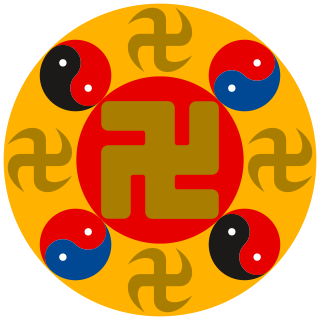
Falun Gong or Falun Dafa is a new religious movement. Falun Gong was founded by its leader Li Hongzhi in China in the early 1990s. Falun Gong has its global headquarters in Dragon Springs, a 427-acre (1.73 km2) compound in Deerpark, New York, United States, near the residence of Li Hongzhi.
In religion, heterodoxy means "any opinions or doctrines at variance with an official or orthodox position".
Li Hongzhi is a Chinese religious leader. He is the founder and leader of Falun Gong, or Falun Dafa, a United States-based new religious movement. Li began his public teachings of Falun Gong on 13 May 1992 in Changchun, and subsequently gave lectures and taught Falun Gong exercises across China.

The Epoch Times is a far-right international multi-language newspaper and media company affiliated with the Falun Gong new religious movement. The newspaper, based in New York City, is part of the Epoch Media Group, which also operates New Tang Dynasty (NTD) Television. The Epoch Times has websites in 35 countries but is blocked in mainland China.

The 610 Office was a security agency in the People's Republic of China. Named for the date of its creation on June 10, 1999, it was established for the purpose of coordinating and implementing the persecution of Falun Gong. The 610 Office was the implementation arm of the Central Leading Group on Dealing with the Falun Gong (CLGDF), also known as the Central Leading Group on Dealing with Heretical Religions, a leading small group of the Chinese Communist Party (CCP). Because it was a CCP-led office with no formal legal mandate, it is sometimes described as an extralegal organisation.

Falun Gong, also called Falun Dafa, is a spiritual practice and system of beliefs that combines the practice of meditation with the moral philosophy articulated by its leader and founder, Li Hongzhi. It emerged on the public radar in the Spring of 1992 in the northeastern Chinese city of Changchun, and was classified as a system of qigong identifying with the Buddhist tradition. Li claimed to have both supernatural powers like the ability to prevent illness, as well having eternal youth and promised that others can attain supernatural powers and eternal youth by following his teachings. Falun Gong initially enjoyed official sanction and support from Chinese government agencies, and the practice grew quickly on account of the simplicity of its exercise movements, impact on health, the absence of fees or formal membership, and moral and philosophical teachings.
Falun Gong, a new religious movement that combines meditation with the moral philosophy articulated by founder Li Hongzhi, first began spreading widely in China in 1992. Li's first lectures outside mainland China took place in Paris in 1995. At the invitation of the Chinese ambassador to France, he lectured on his teachings and practice methods to the embassy staff and others. From that time on, Li gave lectures in other major cities in Europe, Asia, Oceania, and North America. He has resided permanently in the United States since 1998. Falun Gong is now practiced in some 70 countries worldwide, and the teachings have been translated to over 40 languages. The international Falun Gong community is estimated to number in the hundreds of thousands, though participation estimates are imprecise on account of a lack of formal membership.
Li Hongzhi published the Teachings of Falun Gong in Changchun, China in 1992. They cover a wide range of topics ranging from spiritual, scientific and moral to metaphysical.
The Tiananmen Square self-immolation incident took place in Tiananmen Square in central Beijing, on the eve of Chinese New Year on 23 January 2001. There is controversy over the incident; Chinese government sources say that five members of Falun Gong, a new religious movement that is banned in mainland China, set themselves on fire in the square. Falun Gong sources disputed the accuracy of these portrayals, and claimed that their teachings explicitly forbid violence or suicide. Some journalists have claimed that the self-immolations were staged.
James R. Lewis was an American philosophy professor at Wuhan University. Lewis was an academic, scholar of religious studies, sociologist of religion, and writer, specializing in the academic study of new religious movements, astrology, and New Age.

The Kilgour–Matas report is a 2006/2007 investigative report into allegations of live organ harvesting in China conducted by Canadian MP David Kilgour and human rights lawyer David Matas. The report was requested by the Coalition to Investigate the Persecution of Falun Gong (CIPFG) after allegations emerged that Falun Gong practitioners were secretly having their organs removed against their will at Sujiatun Thrombosis Hospital. The report, based on circumstantial evidence, concluded that "there has been, and continues today to be, large-scale organ seizures from unwilling Falun Gong practitioners." China has consistently denied the allegations.

The persecution of Falun Gong is the campaign initiated in 1999 by the Chinese Communist Party (CCP) to eliminate the spiritual practice of Falun Gong in China, maintaining a doctrine of state atheism. It is characterized by a multifaceted propaganda campaign, a program of enforced ideological conversion and re-education and reportedly a variety of extralegal coercive measures such as arbitrary arrests, forced labor and physical torture, sometimes resulting in death.
Qigong, the Chinese practice of aligning breath, movement, and awareness for exercise, healing, and martial arts training, has a history that extends back more than 4,000 years. Contemporary qigong is a complex accretion of the ancient Chinese meditative practice xingqi or "circulating qi" and the gymnastic breathing exercise daoyin or "guiding and pulling", with roots in the I Ching and occult arts; philosophical traditions of Confucianism, Taoism, and Buddhism, traditional Chinese medicine and martial arts; along with influences of contemporary concepts of health, science, meditation, and exercise.
Benjamin David Penny is an Australian academic specialising in religious and spiritual movements in modern and contemporary China. He is a Harold White Fellow at the National Library of Australia.

The predominant religions in Northeast China are Chinese folk religions led by local shamans. Taoism and Chinese Buddhism were never well established in this region of recent Han Chinese settlement. For this reason the region has been a hotbed for folk religious and Confucian churches, which provide a structure, clergy, scriptures and ritual to the local communities. The Way of the Return to the One, the Universal Church of the Way and its Virtue (Shanrendao), and more recently the Falun Gong, have been the most successful sects in Manchuria, claiming millions of followers. Schools of Tibetan Buddhism, traditionally transmitted by the region's Mongol minorities, have made inroads also among Han Chinese.

Taiwan folk beliefs are traditional beliefs widely circulated in Taiwan, including Chinese people's beliefs that combine Daoism, Buddhism, and Confucianism," the Chinese immigrant beliefs that merge the three religions, also including the deification of local heroes and celebrities, also including Wang Ye worship, and Taiwanese aborigines's Ancestors. Ancestral Spirituality, the former, along with the China Minnan region and Guangdong immigrants from the South China region, crossed the Taiwan Strait to the east and took root in Taiwan. Gradually, folk beliefs with local styles emerged, but by and large, the original Chinese people's interfaith gods are still worshipped; the second shows that Taiwanese people are full of feelings of tolerance and knowledge, such as worshipping the Japanese soldiers who sacrificed their lives to save the people; the second, such as Ying Gong and Wan Shan Yi in various places, and some are even more spirit, such as Nan Kunshen Dai Some of the latter still retain their original characteristics, while some beliefs have been Sinicized. Taiwan is also the most religious region in the Chinese world, with 93% of people following mixture of Buddhism, Confucianism, and Taoism, Christian 4.5%, other 2.5%.
Revenge of the Forbidden City: The Suppression of the Falungong in China, 1999-2005 is a 2009 book by James W. Tong, published by Oxford University Press. It describes how the Chinese government suppressed the Falun Gong in that stated time frame. David Ownby of the Université de Montréal described it as "a very nuts-and-bolts book".
Falun Gong and the Future of China is a 2008 book by David Ownby, published by Oxford University Press.
Qigong Fever: Body, Science, and Utopia in China is a 2007 book by David A. Palmer, published by Columbia University Press. It is about the "Qigong fever" in the late 20th century in China.
Falun Gong: The End of Days is a book by Maria Hsia Chang about the Falun Gong.








